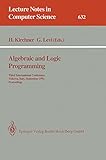Algebraic and Logic Programming [electronic resource] : Third International Conference Volterra, Italy, September 2–4, 1992 Proceedings / edited by Hélène Kirchner, Giorgio Levi.
Material type: TextSeries: Lecture Notes in Computer Science ; 632Publisher: Berlin, Heidelberg : Springer Berlin Heidelberg, 1992Description: IX, 460 p. online resourceContent type: text Media type: computer Carrier type: online resourceISBN: 9783540473022Subject(s): Computer science | Logic design | Computer Science | Programming Languages, Compilers, Interpreters | Logics and Meanings of Programs | Mathematical Logic and Formal LanguagesAdditional physical formats: Printed edition:: No titleDDC classification: 005.13 LOC classification: QA76.7-76.73QA76.76.C65Online resources: Click here to access online
TextSeries: Lecture Notes in Computer Science ; 632Publisher: Berlin, Heidelberg : Springer Berlin Heidelberg, 1992Description: IX, 460 p. online resourceContent type: text Media type: computer Carrier type: online resourceISBN: 9783540473022Subject(s): Computer science | Logic design | Computer Science | Programming Languages, Compilers, Interpreters | Logics and Meanings of Programs | Mathematical Logic and Formal LanguagesAdditional physical formats: Printed edition:: No titleDDC classification: 005.13 LOC classification: QA76.7-76.73QA76.76.C65Online resources: Click here to access online  E-BOOKS
E-BOOKS
| Current library | Home library | Call number | Materials specified | URL | Status | Date due | Barcode |
|---|---|---|---|---|---|---|---|
| IMSc Library | IMSc Library | Link to resource | Available | EBK6044 |
Outline of an object-oriented calculus of higher type -- High-level-replacement systems for equational algebraic specifications -- Termination of rewrite systems by elementary interpretations -- Termination of order-sorted rewriting -- Generalized sufficient conditions for modular termination of rewriting -- A theory of first-order built-in's of prolog -- Fixpoint semantics for partial computed answer substitutions and call patterns -- Oracle semantics for Prologa -- On the relation between primitive recursion, schematization, and divergence -- Term rewriting with sharing and memoïzation -- Definitional trees -- Multiparadigm logic programming -- Non-linear real constraints in constraint logic programming -- A general scheme for constraint functional logic programming -- Incremental rewriting in narrowing derivations -- Counterexamples to completeness results for basic narrowing (extended abstract) -- Uniform narrowing strategies -- Proof by consistency in constructive systems with final algebra semantics -- A fast algorithm for ground normal form analysis -- Eta-conversion for the languages of explicit substitutions -- Serialisation analysis of concurrent logic programs -- Implementation of a toolset for prototyping algebraic specifications of concurrent systems -- Axiomatizing permutation equivalence in the ?-calculus -- A CLP view of logic programming -- Partial deduction of logic programs WRT well-founded semantics -- The finiteness of logic programming derivations -- Theorem proving for hierarchic first-order theories -- A goal oriented strategy based on completion -- On n-syntactic equational theories.
This volume contains the proceedings of the Third International Conference on Algebraic and Logic Programming, held in Pisa, Italy, September 2-4, 1992. Like the two previous conferences in Germany in 1988 and France in 1990, the third conference aims at strengthening the connections betweenalgebraic techniques and logic programming. On the one hand, logic programming has been very successful during the last decades and more and more systems compete in enhancing its expressive power. On the other hand, concepts like functions, equality theory, and modularity are particularly well handled in an algebraic framework. Common foundations of both approaches have recently been developed, and this conference is a forum for people from both areas to exchange ideas, results, and experiences. The book covers the following topics: semantics ofalgebraic and logic programming; integration of functional and logic programming; term rewriting, narrowing, and resolution; constraintlogic programming and theorem proving; concurrent features in algebraic and logic programming languages; and implementation issues.


There are no comments on this title.